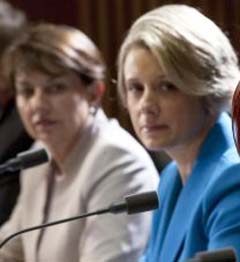fitness news
![]() ,
,![]()
Font size Women’s Health
Namibia, Japan in N$13 million health deal
– Reported, June 11, 2013
 Japan has pledged a grant of N$13 million to Namibia to support the country’s efforts of improving children and women’s health. Namibian and Japanese representatives, together with the United Nations Children Fund (UNICEF) country representative exchanged notes on the grant. Initially, the grant (U$1,5 million N$13 650 million) aims to provide financial contribution to UNICEF supported programmes for children, with particular focus on bridging the gap for maternal and child health services in Namibia.
Japan has pledged a grant of N$13 million to Namibia to support the country’s efforts of improving children and women’s health. Namibian and Japanese representatives, together with the United Nations Children Fund (UNICEF) country representative exchanged notes on the grant. Initially, the grant (U$1,5 million N$13 650 million) aims to provide financial contribution to UNICEF supported programmes for children, with particular focus on bridging the gap for maternal and child health services in Namibia.
The support aims to cover a period of nine months that initially started already in March and will be on until November this year. Over 170 000 women and children in Oshana, Oshikoto, Ohangwena, Omusati, Kunene, Kavango and Caprivi are expected to benefit from the agreement that will provide an essential package of primary health care service.
Currently, Namibias child mortality rate stands at 200 per 100 000 live births and 42 per 1 000 live births respectively according to UNICEF. The grant will help to reduce both the maternal and child mortality.
Speaking during the signing ceremony, Finance Minister Saara Kuugongelwa-Amadhila said Namibia has the largest reductions in child mortality rates between 2000 and 2011.
Kuugongelwa-Amadhila was speaking on behalf of the Minister of Health and Social Services, Dr Richard Kamwi.
She said in the last ten years, government introduced health prevention services free of charge, with rphans and vulnerable children receiving child welfare grants monthly.
We have developed and implemented a road map for accelerating the reduction of maternal and new born morbidity and mortality. But we still have to do more. Namibia is one of the leading countries in the developing world where the government finance more than half of HIV expenditure including the ARVs, he stated.
Regarding the community-based healthcare, the Finance Minister said the country is working hard to bridge the gaps between health facilities and the community by expanding workers’ programmes in most disadvantaged districts.
Japanese Ambassador Yutaka Yoshizwa on behalf of the Japanese government, said the program will benefit more than 80 percent of children under five year old and pregnant women in the seven regions to have access to essential supply of nutrition.
The program also intends to implement low cost but high impact maternal and child health activities in these seven northern regions, said Yoshizwa. Malnutrition among children and pregnant women is still a big challenge especially among the poor.
The problem is sometimes exacerbated by floods and droughts, which occur alternately in Namibia, adds Yoshizwa.
UNICEF representatives in Namibia, Micaela Marques de Sousa, said her organisation will foresee that all children rich and poor in all seven regions benefit from the grant.
They all will have equal access to critical life saving immunisation service and improve the quality of health care for women and their own new-born babies through access to life saving health interventions, De Sousa said.
De Sousa also said the grant will provide an opportunity to build capacity of health workers and frontline volunteers in preparedness.
Most importantly, the fund will assist the Ministry of Health and Social Services in providing necessary services and essential commodities to ensure children, pregnant and lactating women are healthy and well nourished before, during and after natural disasters in those emergency prone regions, she said.
CREDITS.
http://www.thevillager.com.na/
For more Namibia news Click Here